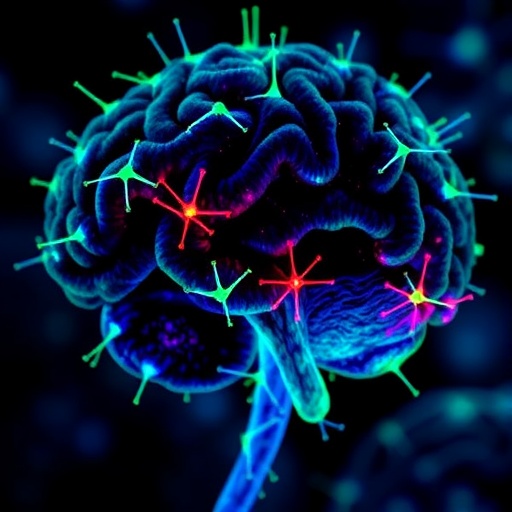In a groundbreaking study, researchers have delved into the effects of repetitive mild traumatic brain injury (mTBI) on cognitive function, focusing specifically on the role of interleukin-33 (IL-33) in the brain. The study, published in Military Medicine Research, sheds light on how decreased levels of IL-33 can significantly contribute to cognitive impairments associated with TBI. The findings not only provide significant insights into the physiological mechanisms underlying brain injuries but also open new avenues for potential therapeutic strategies.
Traumatic brain injuries, even when classified as mild, can have lasting repercussions on cognitive capabilities. The effects of repeated mild TBIs have been an increasing concern, particularly among populations such as military personnel, athletes, and others exposed to head impacts. These injuries have been linked to various neurological disorders, including chronic traumatic encephalopathy (CTE), and ongoing research aims to understand the underlying biological changes that occur after the initial impact.
One critical aspect of the study is the role of IL-33, a cytokine that is crucial in immune response regulation and neuroinflammatory processes. Researchers have observed that levels of IL-33 are significantly reduced in the brain after repetitive mTBI. This decline raises important questions about the cytokine’s function in maintaining cognitive health and its potential as a biomarker for monitoring brain injury.
The study utilized a comprehensive experimental framework involving animal models that were subjected to repeated mild TBIs. Through this setup, the researchers were able to meticulously analyze changes in IL-33 levels and their correlation with cognitive functions such as memory and learning. The results demonstrated a clear inverse relationship; as IL-33 levels declined, cognitive impairments became more pronounced.
Microglia, the resident immune cells of the central nervous system, are known for their role in phagocytosis, a process crucial for clearing debris and maintaining homeostasis in the brain. The study highlighted that decreased IL-33 levels lead to inhibited microglial phagocytosis, exacerbating the cognitive deficits post-injury. This finding underscores the importance of IL-33 not merely as a cytokine but as a potential facilitator of neuroprotection and cognitive preservation.
Moreover, the study’s exploration of microglial function provides a new layer of understanding regarding the mechanisms of TBI. In a healthy brain, IL-33 acts to promote microglial activation and phagocytic activity, thereby assisting in the repair processes following injury. However, the absence of this important cytokine may lead to an accumulation of toxic debris, which further impairs cognitive function and accelerates neurodegenerative processes.
In analyzing the broader implications of this research, it becomes evident that therapeutic strategies aimed at modulating IL-33 levels could benefit individuals susceptible to cognitive impairments followingTBIs. By potentially restoring IL-33 levels or mimicking its actions, it may be possible to enhance microglial function and mitigate the cognitive decline that plagues many TBI patients.
Furthermore, the implications of this research extend beyond military applications. Athletes in contact sports, as well as individuals working in high-risk occupations, could also benefit from interventions targeting IL-33. With increasing awareness of the long-term effects of repeated head trauma, including the militarized and sporting communities, the urgency for effective treatments has never been more critical.
It is also essential to consider the potential of IL-33 as a diagnostic biomarker. The correlation between low IL-33 levels and cognitive decline suggests that measuring this cytokine in the blood or cerebrospinal fluid could provide vital insights into an individual’s risk of sustained cognitive impairment following a TBI. Such a diagnostic tool could enable early interventions, improving outcomes for those affected.
Moreover, the research illuminates the complex interplay of immune responses within the brain post-injury. Understanding these mechanisms can lead to a more comprehensive approach to treatment, integrating neuroinflammation management with cognitive rehabilitation. As research continues to uncover the nuances of brain injury and recovery, it is essential to maintain a holistic perspective that considers both biological and rehabilitative factors.
As we look to the future, the relevance of this study cannot be overstated. With the rising incidence of mTBI in various populations, further exploration of IL-33 and similar cytokines may provide a pathway to new, innovative treatments. Additionally, continued research is essential in understanding the long-term effects of mild TBIs and establishing preventative measures that can safeguard cognitive health.
This study is a testament to the importance of interdisciplinary research in tackling complex health issues. Combining neuroscience, immunology, and clinical insights, the findings contribute significantly to our understanding of TBIs and their impacts on cognitive function. Ultimately, advancing knowledge in this area is crucial for developing effective strategies to support those who serve in high-risk environments, as well as broader society.
In conclusion, the connection between decreased IL-33 levels and cognitive impairments following repeated mTBI presents an important area for future research and therapeutic development. As scientists continue to unravel the intricacies of brain injury and recovery, the hope is that these insights will pave the way for effective interventions, enhancing the quality of life for millions affected by TBIs.
Subject of Research: The role of interleukin-33 in cognitive impairment following repetitive mild traumatic brain injury.
Article Title: Decreased IL-33 in the brain following repetitive mild traumatic brain injury contributes to cognitive impairment by inhibiting microglial phagocytosis.
Article References:
Jia, ZX., Guo, MT., Li, MM. et al. Decreased IL-33 in the brain following repetitive mild traumatic brain injury contributes to cognitive impairment by inhibiting microglial phagocytosis.
Military Med Res 12, 46 (2025). https://doi.org/10.1186/s40779-025-00631-1
Image Credits: AI Generated
DOI: https://doi.org/10.1186/s40779-025-00631-1
Keywords: interleukin-33, mild traumatic brain injury, cognitive impairment, microglial phagocytosis, neuroinflammation.




